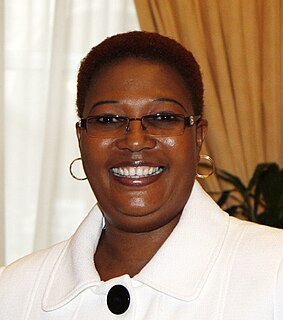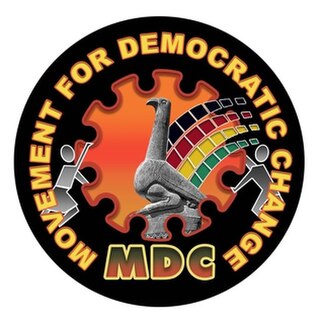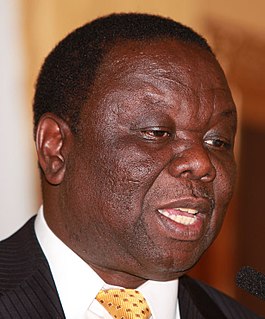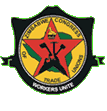Until roughly 2,000 years ago, Zimbabwe was populated by ancestors of the San people. Bantu inhabitants of the region arrived and developed ceramic production in the area. A series of trading empires emerged, including the Kingdom of Mapungubwe and Kingdom of Zimbabwe. In the 1880s, the British South Africa Company began its activities in the region, leading to the colonial era in Southern Rhodesia.

The World Federation of Trade Unions (WFTU) is an international federation of trade unions. WFTU was established in 1945 to replace the International Federation of Trade Unions.

The Zimbabwe African National Union – Patriotic Front (ZANU–PF) is a political organisation which has been the ruling party of Zimbabwe since independence in 1980. The party was led for many years under Robert Mugabe, first as Prime Minister with the Zimbabwe African National Union (ZANU) and then as President from 1987 after the merger with the Zimbabwe African People's Union (ZAPU) and retaining the name ZANU–PF, until 2017, when he was removed as leader.
Gibson Jama Sibanda was a Zimbabwean politician and trade unionist. He was a founding member of the Movement for Democratic Change and at the time of his death was the Vice-President of the faction of the Movement for Democratic Change led by Arthur Mutambara. A former president of the Zimbabwe Congress of Trade Unions, he was first elected to the House of Assembly in the 2000 parliamentary election. He was a member of the Senate and a Minister of State in the Office of Deputy Prime Minister Arthur Mutambara at the time of his death in 2010.
The Southern Rhodesia African National Congress (SRANC) was a political party active between 1957–1959 in Southern Rhodesia. Committed to the promotion of indigenous African welfare, it was the first fully fledged black nationalist organisation in the country. While short-lived—it was outlawed by the predominantly white minority government in 1959—it marked the beginning of political action towards black majority rule in Southern Rhodesia, and was the original incarnation of the National Democratic Party (NDP); the Zimbabwe African People's Union (ZAPU); the Zimbabwe African National Union (ZANU); and the Zimbabwe African National Union - Patriotic Front (ZANU–PF), which has governed Zimbabwe continuously since 1980. Many political figures who later became prominent, including Robert Mugabe and Joshua Nkomo, were members of the SRANC.
The following lists events that happened during 2007 in Zimbabwe.

Nelson Chamisa is a Zimbabwean politician and the current President of the Movement for Democratic Change He served as Member of the House of Assembly of Zimbabwe for Kuwadzana East, Harare. Chamisa was the MDC Alliance's candidate for president in the 2018 general election, having previously been the leader of the party's youth assembly. On 31 March 2020, the Supreme Court of Zimbabwe ruled that Nelson Chamisa was not the legitimate MDC leader in a judgment that settles the drawn out leadership wrangle between him and Thokozani Khuphe.

Thokozani Khuphe is a Zimbabwean politician, trade unionist and the President of the MDC-T breakaway faction of the Movement for Democratic Change (MDC). She was Deputy Prime Minister 2009-13.
Zimbabwe began experiencing a period of considerable political and economic upheaval in 1999. Opposition to President Mugabe and the ZANU-PF government grew considerably after the mid-1990s in part due to worsening economic and human rights conditions. The Movement for Democratic Change (MDC) was established in September 1999 as an opposition party founded by trade unionist Morgan Tsvangirai.
Zimbabwe regained its independence from the United Kingdom on 17 April 1980. Canaan Banana, a Methodist minister and theologian, became the first President of Zimbabwe on 18 April.
Blessing Chebundo is a Zimbabwean politician, a member of parliament and a leading figure in the opposition Movement for Democratic Change (MDC). He rose to fame by defeating Emmerson Mnangagwa in a contest to represent Kwekwe constituency in the parliament of Zimbabwe in the 2000 parliamentary election. Mnangagwa, a heavyweight in ZANU-PF, was predicted to easily win the constituency, but Chebundo won the seat despite threats to his life. As an incumbent, he again defeated Mnangagwa and was re-elected in the March 2005 parliamentary election.

United States–Zimbabwe relations are bilateral relations between Zimbabwe and the United States. Both countries share a common history and language as former British colonies.
Campaigning for the first round of the presidential election held in Zimbabwe on 29 March 2008 took place from February to March. There were three major candidates: President Robert Mugabe of the ruling Zimbabwe African National Union - Patriotic Front (ZANU-PF), Morgan Tsvangirai of the opposition Movement for Democratic Change, and the independent candidate Simba Makoni.
This article gives an overview of liberal parties in Zimbabwe. It is limited to liberal parties with substantial support, mainly proved by having had a representation in parliament. The sign ⇒ means a reference to another party in that scheme. For inclusion in this scheme it isn't necessary so that parties labeled themselves as a liberal party.

Before its split in 2005, the Movement for Democratic Change (MDC) was a Zimbabwean political party organised under the leadership of Morgan Tsvangirai. The MDC was formed in 1999 as an opposition party to President Robert Mugabe's Zimbabwe African National Union – Patriotic Front (Zanu-PF). The MDC was made up of many civic groups who campaigned for the "No" vote in the 2000 constitutional referendum, which would limit a president's service to two terms, before the introduction of a Prime Minister, as well as giving legal immunities to the State. However, as the term limit was not retroactive, Mugabe could still have maintained the presidency for two more terms. The most controversial part of the constitution was the land reform policies. It stated that, as in the Lancaster House Agreement, Britain would fund land reform from white settlers to landless black peasants. If Britain failed to compensate the farmers, the government would take the farms, without compensation. The party split over whether to contest the 2005 senate election, into the Movement for Democratic Change – Tsvangirai (MDC-T), the larger party led by Morgan Tsvangirai, and the Movement for Democratic Change – Ncube, a smaller faction then led by Arthur Mutambara and later led by Welshman Ncube. However, the two factions formed an electoral pact for the 2018 Zimbabwean general election called the MDC Alliance and re-united under the original name, the Movement for Democratic Change (MDC), in September 2018.

The Movement for Democratic Change – Tsvangirai (MDC–T) was a centre-left political party and was the main opposition party in the House of Assembly of Zimbabwe ahead of the 2018 elections. After the split of the original Movement for Democratic Change in 2005, the MDC–T remained the major opposition faction, while a smaller faction, the Movement for Democratic Change – Ncube, or MDC–N, was led by Welshman Ncube. The two parties re-united in 2018 under the original name, the Movement for Democratic Change.
Felix Magalela Mafa Sibanda born February 5, 1951 is a Zimbabwean activist, community organizer, politician and member of parliament for Magwegwe in Bulawayo for the MDC-T party, as well as being provincial spokesperson for that party. He is from the Ndebele Royal inner circle, his great great grand father, Masonginyoka arrived from Transvaal with Mzilikazi as a personal doctor to the King. Tshokomela, his fathers father was also King Lobengula's doctor who gave rise to his father Maphahla, also nick named Mafa Sigodo meaning the "heir" hence the name Mafa or Ilifa.

Morgan Richard Tsvangirai was a Zimbabwean politician who was Prime Minister of Zimbabwe from 2009 to 2013. He was President of the Movement for Democratic Change, and later the Movement for Democratic Change – Tsvangirai (MDC–T), and a key figure in the opposition to former President Robert Mugabe.

Ebrahim Patel is a South African cabinet minister, who holds the position of Minister of Trade, Industry and Competition. He previously served as Minister of Economic Development from 2009 to 2019.









